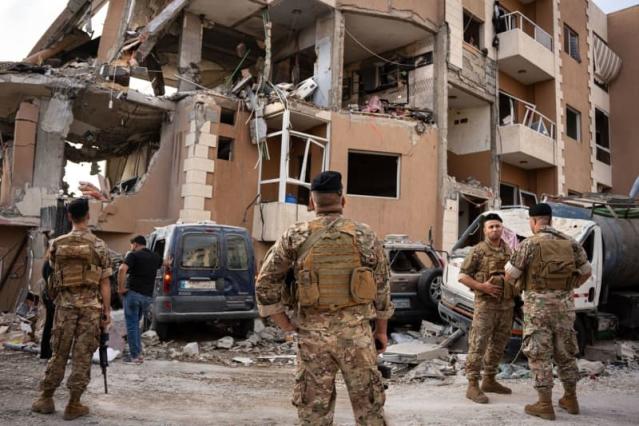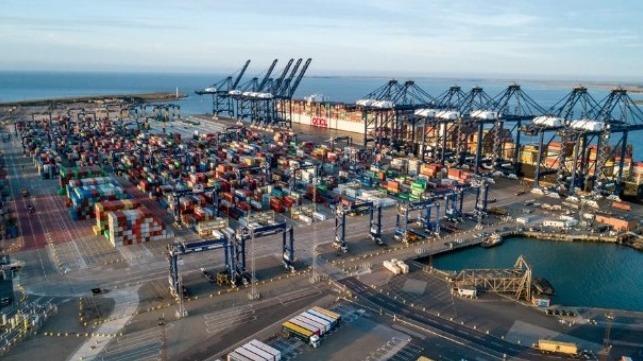Foreign News
Survey shows UK Ports Widely Unprepared for Brexit

…As New Zealand issues alert over toxic shellfish***
CEOs and directors of around 100 ports and harbours around the UK polled by the Shipping and Maritime practice of Odgers Berndtson, a global executive search firm, have disclosed a startling lack of readiness for the looming Brexit.
With ten weeks to go to what is likely to be a no-deal Brexit, potentially resulting in disruptions and congestion at UK ports, little or no planning has been done, the poll shows.
When leaders at UK port and harbour authorities were asked about their state of readiness, only 16% said they had made any “significant or practical” plans for Brexit. The remainder were equally split between ports doing “only some high-level planning” and nothing at all.
“The ports industry is keen to seize on any opportunities arising from Brexit, but this is the first real indication of what’s actually happening outside ports like Dover,” said Paul Butterworth, head of the Maritime & Shipping Practice at Odgers Berndtson.
According to the poll:
Although most (over 80%) UK ports have done little or no planning for Brexit, over half (59%) expect a negative or strongly negative impact;
Despite the lack of preparation, only 25% of UK port leaders think they are currently in a position to handle Brexit well. A third believe they could cope, but ideally with further investment, whilst over 40% either don’t know or doubt their ability to handle additional demands.
Physical blockages and additional complexity arising from Brexit are the principal concerns of leadership teams, with around half (respectively 43.5% and 52%) giving these as their most pressing worries.
Almost 80% gave physical infrastructure as their top priority for any further investment. Technology was first priority for 26%, with almost half (47%) making their second highest priority for additional investment. Most of the senior management teams (83%) believe their ports have the right people to lead in the short term. However, a similar number identified investing in senior people as a priority, albeit less urgent than infrastructure and technology.
Responding to the survey, the British Ports Association has suggested ports and terminals are considering a range of potential outcomes, stressing that the uncertainty has made it difficult for ports to make firm investment decisions in potential solutions.
Furthermore, like many others in the logistics chain ports are awaiting details from the government as to what the final trading environment will look like.
“The ports industry has been involved in extensive planning and discussion with the UK Government on the challenges a no-deal Brexit would present, but given that there is still no certainty around our trading relationship with Europe after Brexit it is not surprising that some ports have been unable to fully prepare,” Richard Ballantyne, the Chief Executive of the British Ports Association, said.
As explained, there is a variety of levels of exposure to Brexit challenges across the UK ports sector, stressing that ferry ports would be impacted the most.
“The industry has been working at a national level as well as with local resilience forums and other groups to ensure that ports and partners across the freight and logistics sectors – including Government agencies at the border – will be prepared for any potential disruption,” he added.
“This research underlines the importance of securing an agreement and negotiating a future relationship that does not put in place any new barriers to free flowing trade.”
In the meantime, New Zealand Ministry for Primary Industries (MPI) on Wednesday issued a public health warning on the consumption of toxic shellfish from the coastal area of the Bay of Plenty down to Bowentown Heads.
Routine tests on shellfish samples taken from this region in the North Island have shown levels of toxins above the safe limit, said an MPI statement.
MPI added that anyone eating shellfish from this area is potentially at risk of illness.
Cooking shellfish cannot remove the toxin, it said, adding that paua, crab and crayfish might still be eaten if the gut has been completely removed prior to cooking, as toxins accumulate in the gut.
The ministry said it will continue to monitor the toxin levels.
It added that commercially harvested shellfish, sold in shops and supermarkets or exported, is subject to strict water and flesh monitoring programmes by the MPI.
This is to ensure they are safe to eat.
Additional report from World Maritime News

Foreign News
Syrian Mass Graves Expose “Machinery of Death” Under Assad, Top Prosecutor Says

An international war crimes prosecutor Stephen Rapp said evidence emerging from mass grave sites in Syria has exposed a state-run “machinery of death” under toppled leader Bashar al-Assad.
According to Rapp more than 100,000 people have been tortured and murdered since 2013.
Speaking after visiting two mass grave sites in the towns of Qutayfah and Najha near Damascus, former U.S. war crimes ambassador at large Stephen Rapp said “We certainly have more than 100,000 people that were disappeared into and tortured to death in this machine.
“I don’t have much doubt about those kinds of numbers given what we’ve seen in these mass graves. We haven’t seen anything quite like this since the Nazis.’’
Rapp led prosecutions at the Rwanda and Sierra Leone war crimes tribunals and is working with Syrian civil society to document war crimes evidence and also helping to prepare for any eventual trials.
He added, “From the secret police who disappeared people from their streets and homes to the jailers and interrogators who starved and tortured them to death, to the truck drivers and bulldozer drivers who hid their bodies, thousands of people were working in this system of killing.
“We are talking about a system of state terror, which became a machinery of death.”
Hundreds of thousands of Syrians are estimated to have been killed since 2011 when Assad’s crackdown on protests against him spiralled into a full-scale war.
Both Assad and his father Hafez, who preceded him as president and died in the year 2000, have long been accused by rights groups and governments of widespread extrajudicial killings, including mass executions within the country’s prison system and using chemical weapons against the Syrian people.
Assad, who fled to Moscow, had repeatedly denied that his government committed human rights violations and painted his detractors as extremists.
The head of U.S.-based Syrian advocacy organisation the Syrian Emergency Task Force, Mouaz Moustafa, who also visited Qutayfah, 25 miles (40 km) north of Damascus, has estimated at least 100,000 bodies were buried there alone.
The International Commission on Missing Persons in The Hague separately said it had received data indicating there may be as many as 66, as yet unverified, mass grave sites in Syria. More than 157,000 people have been reported missing to the commission.
Commission head Kathryne Bomberger told Reuters its portal for reporting the missing was now “exploding” with new contacts from families.
By comparison, roughly 40,000 people went missing during the Balkan wars of the 1990s.
Bomberger said for the families, the search for the truth in Syria could be long and difficult. A DNA match will require at least three relatives to provide DNA reference samples and take a DNA sample from each skeletal remains found in the graves.
The commission called for sites to be protected so that evidence was preserved for potential trials, but the mass grave sites were easily accessible on Tuesday.
The State Department of the United States is engaged with several UN bodies to ensure that the Syrian people receive answers and accountability.
Syrian residents living near Qutayfah, a former military base where one of the sites was located, and a cemetery in Najha used to hide bodies from detention sites described seeing a steady stream of refrigeration trucks delivering bodies which were dumped into long trenches dug with bulldozers.
Abb Khalid, who works as a farmer next to Najha cemetery, “The graves were prepared in an organised manner the truck would come, unload the cargo it had, and leave. There were security vehicles with them, and no one was allowed to approach, anyone who got close used to go down with them.’’
In Qutayfah, residents declined to speak on camera or use their names for fear of retribution, saying they were not yet sure the area was safe after Assad’s fall. “This is the place of horrors.’’
Inside a site enclosed with cement walls, three children played near a Russian-made military satellite vehicle. The soil was flat and levelled, with straight long marks where the bodies were believed buried.
Reuters
Foreign News
Israeli Parliament Passes Law Banning UNRWA From Operating In Israel

The Israeli parliament, the Knesset, has passed a law prohibiting the United Nations Relief and
Works Agency for Palestine Refugees in the Near East (UNRWA) from operating in Israel.
According to local media reports, the new law, which received support from 92 out of 120 parliament members, passed despite opposition from the United States and several European countries.
The law stipulates that UNRWA will not operate any representation, provide services, or conduct any activities, directly or indirectly, within Israeli territory.
“As it is proven that UNRWA and its employees participate and are involved in terrorist activity against Israel.
“It is proposed to establish that Israel will act to stop all activities of the agency in its territory,” the explanatory notes to the law read.
In a post on X, Philippe Lazzarini, commissioner-general of UNRWA, said the vote by the Israeli Parliament against UNRWA “is
unprecedented and sets a dangerous precedent.”
“It opposes the UN Charter and violates the State of Israel’s obligations under international law.
“These bills would only deepen the suffering of Palestinians, especially in Gaza where people have been going through more than a year of sheer hell,” he wrote.
– Xinhua
Foreign News
Lebanese Military Reports Troops Killed In Israel-Hezbollah Conflict

…As EU ministers sanction Iran over missiles supplied to Russia
Four soldiers from the Lebanese army have died in the conflict between the Hezbollah militia and Israel, and a further 12 Lebanese soldiers have been killed while not on duty, army sources told DPA.
Two soldiers were recently killed by Israeli fire while on duty at a military post in Kafra in the south of the country, the Lebanese army said.
Lebanon’s military was seen as weak and under-resourced.
It was not directly involved in the conflict between Israel and Iran-backed Hezbollah.
It has partially withdrawn from positions along the country’s southern border with Israel since the Israeli ground offensive began two weeks ago.
The army did, however, return fire when one of its bases in Bint Jbeil in the south came under Israeli attack.
In another development, the EU foreign ministers adopted sanctions on Iran for supplying Russia with ballistic missiles for use in Ukraine on Monday.
Diplomats told DPA that the EU sanctions target companies and individuals involved in Iran’s ballistic missile programme and the delivery of these and other weapons to Russia.
The European Union had previously warned Iran several times against passing on ballistic missiles to Moscow and views the step as breaching a new taboo.
Iran has vehemently denied supplying Russia with the weapons.
According to Tehran, the country has a strategic cooperation with Moscow, although this is not related to the war in Ukraine.
Tehran maintains that providing military aid to warring parties is inhumane.
One of the targets is the Iranian state airline Iran Air.
Britain, Germany and France have already announced they are working on sanctions targeting the company.
The EU sanctions, including a freeze on assets held in the bloc and a travel ban on individuals, will enter into force upon their publication in the EU Official Journal, a register of EU laws.
EU foreign ministers are meeting to debate the escalating conflict in the Middle East and the EU’s efforts to support Ukraine against the Russian invasion, despite Hungarian resistance.
The bloc also plans to hit Russian actors and organizations accused of destabilizing Moldova’s democracy and security with new sanctions ahead of a crunch referendum on EU membership later this month.
The role of Iran and its regional proxies Hezbollah in Lebanon and Hamas in Gaza will be in focus at the foreign ministers’ meeting in Luxembourg.
The EU is struggling to find a response that could help stop the conflict from spiralling into a full-scale regional war in the Middle East.
Top EU diplomat Josep Borrell voiced frustration over the bloc’s discordance on an increasingly tense Middle East conflict, especially concerning criticism of Israel.
“It takes too long to say some things which are quite evident,” he said upon arrival.
“It’s quite evident that we should be against Israeli attacks against UNIFIL, especially because our soldiers are there.”
He referred to a joint EU statement on recent attacks on the UN peacekeeping mission in southern Lebanon, issued on the eve of the gathering.
Borrell also said that EU countries are at odds over arms deliveries to Israel after Spain called for an embargo.
“Member states are strongly divided,” he said, adding that other EU countries are in favour of delivering more weapons to Israel.
Another major issue is Hungary’s over-a-year blockade of a key EU military aid policy for Ukraine, the European Peace Facility (EPF), worth €6.6 billion ($7.2 billion).
Budapest does not want to send arms to Ukraine, believing that doing so only prolongs the war.
“Frankly speaking, it’s a lot of time, it’s a lot of money, and it’s undermining our political will of supporting Ukraine on any front,” an EU official said in a sign of growing EU impatience with Hungary.
The bloc’s diplomatic arm, the European External Action Service, has devised a plan to make contributions to the EPF fund voluntary instead of mandatory, as a technical workaround to Hungary’s opposition.
An EU diplomat said that Hungary has shown a willingness to agree to this solution.
New Ukrainian Foreign Minister Andrii Sybiha spoke with EU foreign ministers via video link.
Borrell welcomed his contribution in a post on X and promised new deliveries of weapons for Ukraine.
British Foreign Minister David Lammy is also in Luxembourg, the first time a British foreign minister has attended a gathering of EU foreign ministers alone since Britain left the EU in 2020.
– dpa































1 Comment